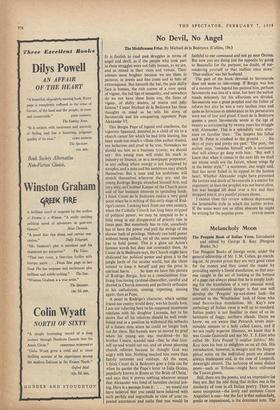No Devil, No Angel
The Meddlesome Friar. By Michael de la Bedoyere. (Collins, 18s.)
is foolish to read past struggles in terms of angel and devil, as if the people who took part in these struggles were not fully human, as we are, and as mixed in their vices and virtues. Their colours seem brighter because we see them in pictures, in jewels and fine coats and in hats of extravagance. But beneath the hat, the pale shifty face is human, the rich curves of a nose speak of vigour, the full lips of sensuality, and nowadays do we not have these faces too, the faces of vigour, of shifty doubts, of mania and jolly fatness? Count Michael de la Bedoyere has these thoughts in mind as he tells his story of Savonarola and his conquering opponent Pope Alexander VI.
This Borgia Pope of legend and anathema, the vigorous Spaniard, destined as a child of six to a church career for which he had little leaning, has been made too much a villain (this author thinks), too lecherous and cruel to be true. Nowadays we should see him as a business tycoon; we should say : this young man will make his mark in industry or finance, or as a newspaper proprietor, in any calling where energy is not hampered by scruples, and a man and his ambitions may stretch themselves. But a man and his ambitions will stretch themselves wherever they are, and the young Rodrigo Borgia stretched himself first, and very ably, as Cardinal Keeper of the Church purse and of her business interests in spreading lands. I think Count de la Bedoyere makes a very good point when he is writing of this early stage of Rod- rigo's career. Looking back from our own century, when the Catholic Church has long been stripped of political power, we may be tempted to be a little smug in our disapproval of priestly rule in times past. But somebody has to rule, somebody has to have the power and pull the strings of the shower bath of privilege. Nobody can hold power without being sullied, yet all the same somebody has to hold power. This is a gloss on Acton's famous words but does not contradict them. As Count de la Bedoyere says, the Church might have abdicated her political power and given it to the jungle lords of the secular world, but she chose instead to keep it herself and pay the price in spiritual harm. . . . So then we have this picture of Rodrigo Borgia, first as a conscientious free- living free-loving cardinal-chancellor, careful and shrewd in Church interests and perfectly orthodox in his catholicism, sinning, repenting, sinning again; then as Pope.
A point in Rodrigo's character, which neither friend nor enemy would deny, was his family love. I am not referring here to his supposed incestuous relations with his daughter Lucrezia, but to his desire that all his relatives should be well estab- lished and in a position to withstand the setbacks of a future time when he could no longer look out for them. His bowels were so moved by 'grief when his young son was murdered—by his brother Cesare, scandal said—that he shut him- self up and would not eat, and set about planning church reforms because he thought God was angry with him. Nothing touched him more than family successes and mishaps. All the same, I think Count de la Bedoyere goes a little too far when he quotes the Pope's letter to Julia Orsino, popularly known in Rome as 'the Bride of Christ,' and says that it proves nothing whatever except that Alexander was fond of harmless clerical jest- ing. Here is a passage from it : . . we would not have believed that you could have behaved with such perfidy and ingratitude in view of your re- peated assurances and oaths that you would be faithful to our command and not go near Orsino. But now you are doing just the opposite by going to Basanello for the purpose, no doubt, of sur- rendering yourself to that stallion once more.' 'That stallion' was her husband.
The part of the book devoted to Savonarola does not seem so interesting. If Borgia was less of a monster than legend has painted him, perhaps Savonarola was less of a saint, but here the author treads delicately for his affections are divided. Savonarola was a great prophet and the father of reform but also he was a very tactless man and quite as ferocious in intolerance as his persecutors were out of fear and greed. Count de la Bedoyere quotes a poem Savonarola wrote at the age of twenty as anticipating by twenty years his struggle with Alexander. This is a splendidly vatic utter- ance on familiar lines : 'The Sceptre has fallen and St. Peter is crushed to the ground . . . the days of piety and purity are past.' The poet,' the author says, 'consoles himself with a sentiment that will always go deep with him : "But well I know that when it comes to the next life we shall see whose souls are the fairest, whose wings fly in the better style,"' a sentiment, one might add, that has never failed in its appeal to the human heart. Whether Alexander might have prevented the torture and death of Savonarola is a matter for argument; at least the prophet was not burnt alive, but was hanged till dead over a fire and then dropped into it, as a painful picture shows.
I cannot close this review without deprecating the lamentable style in which the author writes. If the sense were not so often obscure he might
be writing for the popular press. STEVIE SMITH


































 Previous page
Previous page